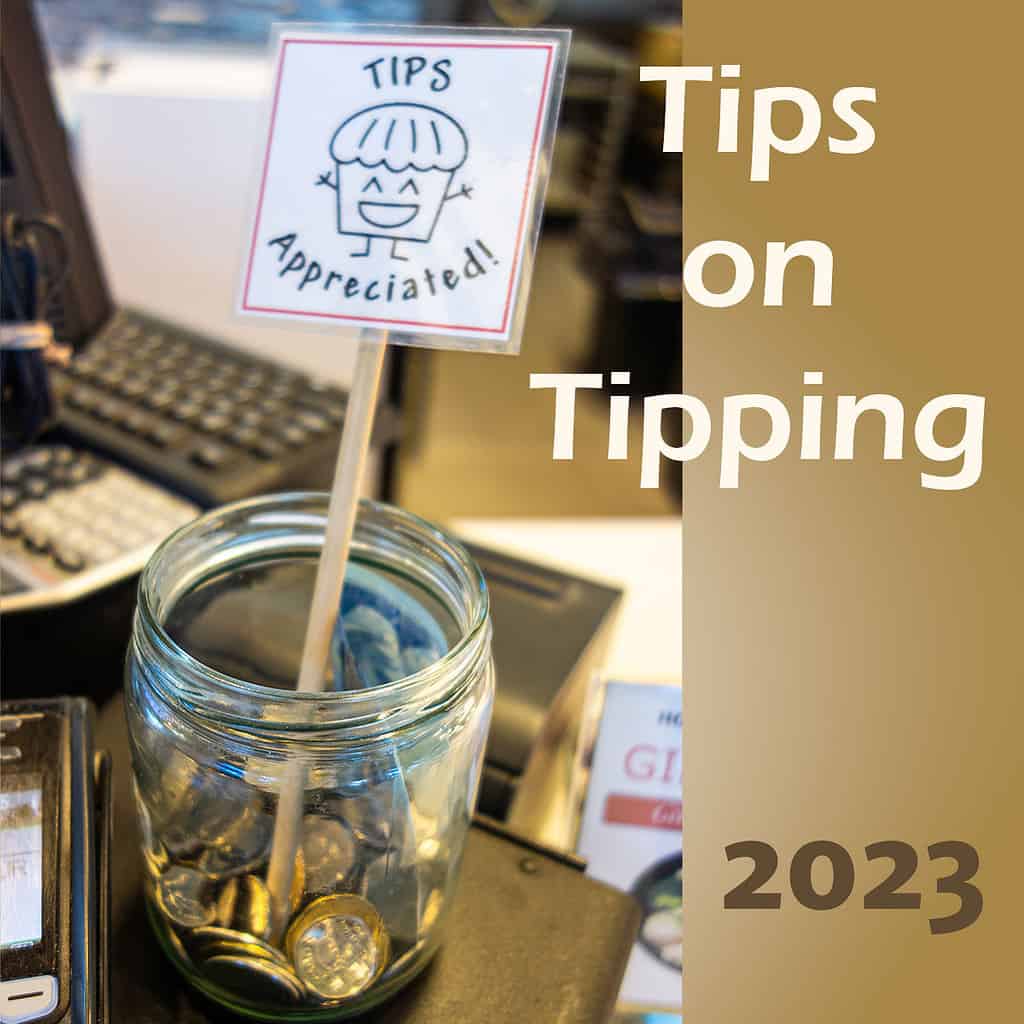It seems odd to me that people have such strong opinions about tipping – especially those opposed to it. I have traveled a lot over the last three decades. Not as much as the true “road warriors,” but far more than most people. I travel all over the US on a regular basis, and generally visit a minimum of two or three other countries each year. I have been to five continents and find lots of places where tips are appreciated, and a few where they are discouraged.

So let’s start with the “appreciated” and “discouraged” discussion. The one place that stands out as most adamant about discouraging tipping is Australia. Business owners often get angry with tourists who tip their staff. The common argument is, “My employees are paid well. They don’t need your tips.” But that’s the owner’s perspective, not the employee’s.
In my experience, all over the world, restaurant and bar staff are among the lowest paid people people in any society. The same is generally true of folks who clean hotel rooms. All of these people are grateful to have a little extra money to spend. Even in Australia and Europe, where tipping is not the norm, I have talked to hundreds of service people over the years. None of them has ever said, “We don’t need your money. We are paid a good wage.”
A Question of Service
Having traveled to dozens of countries, and all across the US, I have seen first hand that there is a very strong connection between tipping and service. Among the worst service you will find anywhere on earth, you can count Australia and those places in Europe that discourage tipping. And this makes perfect sense. The staff receive the same pay whether you are extremely happy, pleased, displeased, or completely irritated.
You’ll notice, in places like this, that you are less likely to have table service. So you order at the bar and then take a number to your table. And while you’re waiting to order, the servers don’t care how long you’ve been waiting, or sometimes what order people arrived. Why should they care? Yes, there’s some grand belief that the overall service reflects on the whole company. But how many minimum wage, short-term employees really focus intently on that concept?
In my opinion, there’s a direct connection between tipping and good service. And the fact that the bosses think they are paying well is not really a significant factor for the employees.
Bad Bosses
I was quite naive until a few years ago. I thought that leaving a tip automatically meant that it went to the service person. Then one day I mentioned an extra tip to my house cleaner and learned that the people sent to my house had never received the tips I included with my monthly payment. The owner had kept all of their tips. I was surprised and irritated. I gave the person I was talking to a good sum of money to share with her co-workers. And then I fired the service.
Since then I have made a point of putting tips into the hands of people directly whenever possible. And I’ve kept my eyes and ears open. I discovered that it’s common for hotel managers to visit rooms and steal the tip money intended for the housekeepers. So now I put an envelop with a thank you note in a place where the housekeeper will find it. This is not just with low-end motels. Brand name hotels and resorts are all the same. It’s very sad to me.
Similarly, I tip massage therapists, delivery people, and others directly whenever possible.
There are also good bosses. When I was a young adult, I went to tip someone who had given excellent service and he stopped me with this information: “I’m the owner. Owners and managers don’t need tipping. Employees should be tipped, if appropriate.” That was a very clear, concise set of guidelines I’ve always remembered.
Very recently, I checked into a small hotel in southern California. There were stairs right next to the front desk and the elevator was down the hall a bit. When I was told that my room was just at the top of the stairs, I decided to drag my suitcase and another piece of luggage up the stairs. I was traveling with tabletop signs and handouts that were heavy.
So I asked guy at the front desk to watch one bag while I hefted the other one up the stairs. When I got to my room, I put down the suitcase and turned to go get the other. The guy was standing there with my other bag. I was surprised and started to open my wallet to give him a couple of bucks. He promptly said, “No thank you. I’m one of the owners.” It was both excellent service and a reminder that the rule about owners still stands.
When to Tip – Especially in the Era of Robots
The question of when to tip has become a bit muddled with modern services. Here are my thoughts on the emerging service industries.
If someone is just an order taker, a tip may not be necessary. But then, there’s nothing for the folks who bring you food or prepare it. But, if there’s a sign indicating that tips are shared with servers, etc., then I would go ahead and tip in order to encourage good service. I would love it if these signs become common.
If ordering and paying are self-service and the wait staff are really just delivering food, a lower tip percentage is in order. On one hand, the staff (cooks, wait staff, bus staff, and even dishwashers) are generally very low paid. On the other hand, if you don’t have a point person who personifies your dining experience, it’s a little harder to pay more for better service.
If you have the opportunity to tip “up front,” you can often get better service. The best example of this is at a crowded bar. If you wait a while to order drinks, tip big the first time and the bartender will likely remember you when you return for more. Remember, in a bar, a good bartender knows how many people are waiting, who got there first, and who treated them well. This is where generosity pays off.
For other general services (cleaning, delivery, driving, etc.), a decent percentage of the service fee is still in order. I tend to tip well. For me, 10% is the low end and rounding up from the 20% mark is the high end.
For some services, such as housekeepers at the hotel, I consider $5/night to be a reasonable tip in the US. In the pandemic, many hotels cut back on daily service so it’s now every three or four days. It’s hard to tip for days when I receive zero service. So I do adjust for the number of actual cleaning days.
As a side note: Shame on Marriott and other hotel chains that cut these jobs so severely, boosted their profits dramatically, and then did not return to full service once the pandemic eased. For me, this deserves to be answered with a lower level of loyalty, even though I have lifetime status.
The bottom line on institutionally lower levels of service: You’ll probably be tipping more when you get good personalized service and tip less as humans are replaced with automations.
“Recommended” Levels for Tipping
One of the most irritating recent trends is recommended levels of tipping. They tend to be higher than most people have historically tipped. I was recently in a taxi that offered up recommended tips of 17.5% (a very odd number), 20%, and 25%, plus custom.
Since I’m often around the 20% level, that’s the easy choice for me. If service is low, or I leave the taxi grateful to be alive, it might be very low. And if the driver whines about how little they make with Uber or Lyft, that generally lowers my tip as well. Ironically, this entire post is about helping people in low paying jobs. But if someone chooses to do a job, part of the tip is directly related to a good service experience, which doesn’t include complaining to the customer about your poor job choices – especially when unemployment is lower than it’s been in your lifetime.
My biggest pet peeve is when tips are added to the bill without permission. I understand why this is done with groups for ten or twelve. But when there are one or two people, adding an automatic tip is very bad form. I try to ask the server whether they actually receive that money. Most do. So I leave it at the recommended level. But I tend not to add an additional amount.
One final note: At high end restaurants, I tend to tip closer to 10%. The primary reason for this is that a percentage based on an absurdly high price takes us away from the argument that these folks are underpaid. Their salary might be minimum wage, but if they get 10-15% of a $200 bill for each table, chances are good that they are no longer underpaid.
Final Notes
These are just some of my thoughts. I find that people are very happy to get tips no matter where they are in the world. I don’t tip managers and owners, generally. But I do tip individuals who provide a service, such as creative people on Fiverr or related services.
You need to figure out what your rules are. Personally, I find no value in the argument that these people should just do their jobs and be happy. As a rule, I tip people who earn very little money by the standards of their country – no matter what their bosses believe.
I welcome your feedback. What “rules” do you have around tipping at home and away?
🙂









3 Responses
I leave tips because the restaurants underpay their workers. But I’m down on tipping in general. It’s a custom that has got to go.
Americans started leaving tips in restaurants in the first half of the 20th century, when they came back from Europe, where it was the custom. Since then, tipping in American restaurants has become routine, while it is unknown in Europe.
About 80 years ago, a couple could eat out in a restaurant for about five dollars. They could leave about 15% of that in the form of three quarters. Then the waitress could put those quarters in her apron pocket. Those three quarters were an expression of gratitude–an extraordinary payment for extraordinary service. She didn’t have to tell her boss or the Internal Revenue Service about them, because it was none of their business.
In those days, tipping was a lovely custom. But over time, three things went wrong:
1. States allowed an exemption to the minimum wage for service industries, like restaurants, where the employees made part of their income from tips
2. The I.R.S. made it mandatory to report tip income on Form 1040, thereby making it just another part of a waitress’ wage
3. Paying cash in restaurants became less common, replaced by patrons paying by credit card and writing in the tip, thereby making the tip simply a routine part of the payment, and part of the restaurant’s profits
When tips are routine and expected, they are meaningless.
My proposed solution is this: abolish all exemptions to the minimum wage. Then restaurants would have to pay their waitresses 𝘢𝘵 𝘭𝘦𝘢𝘴𝘵 the minimum wage (I think they should get a lot more), whether they get tips or not. Diners who get extraordinary service could still surprise their waitress with a little extra money if they so choose. Every penny of that tip would go directly to the waitress and added to her paycheck.
Some people might object that if paying tips no longer became necessary, then we wouldn’t have the option of withholding them. Ah, but we now have an even 𝘣𝘦𝘵𝘵𝘦𝘳 way of punishing bad service: all those websites where we can review restaurants, like TripAdvisor, Yelp, and Zagats. That way, our complaints can reach hundreds of people, and not just one incompetent waitress.
I love your blend of logic, emotion, and pragmatism in your recommendations. I particularly love your comment about tipping in high-end restaurants. I’ve always felt uncomfortable about the 15%-20% thing when the bill gets large ()$100+). And I agree with most everything you said, in concept at least. For me, I tend to have a different perspective (and approach) when considering circumstances I have no control over and where free-will is given. I believe the tip is a way of saying thanks for doing an above average good job. I know that rubs a lot of people the wrong way. So think about the garbage men who dump trach all over the street when they empty your garbage vs. those who pick up messes (whether they’re responsible or not). That is going above and beyond, better than average service. Do they get tips? Not usually. And as to being underpaid? Well, I always talk to an owner when a service person, waiter/waitress/busser/etc. at a restaurant does an above average job. i think those types of direct communications go a long way toward making the job easier for the individual. As to tipping to offset low wages, I do not buy into that. And yes, you do have a good point – tipping can improve service, especially at a busy bar!
I was somewhat disappointed you did not mention the cashiers in self-service convenience stores and food shops that request a tip when paying with your card. In some situations I can see where a tip might be warranted. But adding it to the checkout process when there’s people standing behind you and they can see that you just checked no tip or custom and left a $0 amount because all they did was ring up your order. This is guilt tipping.